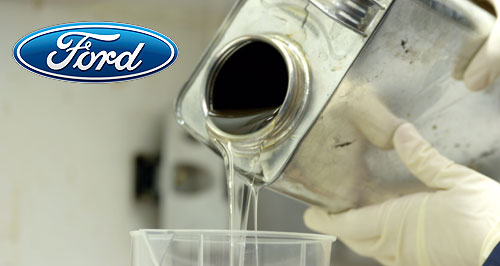Make / Model Search
News - FordFord reduces oil dependenceExpanding horizons: Ford's experimental foam and plastic uses more sustainable ingredients than conventional materials and will be used in its cars within five years. Greener plastics research to cut Ford production petrochemical use31 May 2016 FORD is loosening the petrochemical stranglehold on its manufacturing operations with a range of experimental plastics that not only use less oil-based ingredients, but also lock up carbon dioxide (CO2) in the process. The global car-maker's research is developing a variety of foam and plastics that use more CO2-based polyols in place of chemicals derived in the petrochemical industry, which has the potential to reduce petroleum use by 272,000 tons per year, Ford says. In addition to the reduced dependence on finite oil resources, the experimental chemicals can also be used to lock away waste CO2 produced in other manufacturing processes and industry, preventing its contribution to global warming if it were released to the atmosphere. Working with polymer specialist Novomer, Ford has produced small batches of materials that will be initially used for seat padding, interior mouldings and sound insulation, but the car-maker is expecting to find other applications for the products as its research progresses. The range of greener materials are expected to find their way into production models within five years, according to Ford, and is an important step on its way to producing vehicles entirely from sustainable sources. “Ford is working aggressively to lower its environmental impact by reducing its use of petroleum-based plastic and foam,” said Ford Motor Company senior technical leader of sustainability Debbie Mielewski. “This technology is exciting because it is contributing to solving a seemingly insurmountable problem – climate change. We are thrilled to be leading the charge toward reducing carbon emissions and the effects of climate change.” While cars are often cited as the main offender when it comes to climate change caused by the greenhouse gas CO2, large scale industry and even agriculture play a significant part. According to the British Plastic Federation, four per cent of global oil consumption is in the plastics manufacturing industry alone. The new Converge-branded polyols are the latest in line of more sustainable Ford manufacturing materials, which have included a seat foam made from soybeans, carpets made from recycled clothing, recycled plastic bottle seat fabrics and boor bolsters derived from the Kenaf plant. “Novomer is excited by the pioneering work Ford has completed with our Converge CO2-based polyols,” said Novomer chief business officer Peter Shepard. “It takes bold, innovative companies such as Ford to enable new technologies to become mainstream products.” Polymeric polyols are an essential component in the manufacture of other polymers including foam products for a wide variety of industries and commonly rely on epoxides derived from oil. Other research has shown that vegetable oils can replace the mineral oil component.  Read more |
Click to shareFord articlesResearch Ford Motor industry news |











Facebook Twitter Instagram